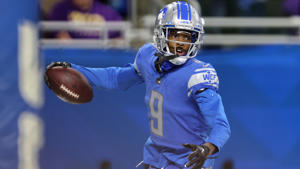
© Provided by Sporting News
The American approach to gambling has been so juvenile for so long that even as things mature legally, it’s almost inevitable that junior-high attitudes remain.
Which is why it was no particular surprise – albeit still a disappointment – to hear the NFL lambasted for hypocrisy following the suspensions of five players for varied offenses of league rules involving wagering.
Three players – Quintez Ceptus, C.J. Moore and Shaka Toney – were suspended indefinitely for wagering on NFL games. Two players – Jameson Williams and Stanley Berryhill III – were suspended six games each for placing bets while in a team venue. Four of those players played in the 2022 season for the Lions; Toney was a member of the Commanders.
There were scores of articles written nationally about the “hypocrisy” of these suspensions given the NFL’s embrace of sports gambling since it became widely legal, in various forms, across the U.S. In particular, former Cowboys receiver Dez Bryant called the suspensions “insane”, in a social media post. “Make it make sense,” he said.
That might be the easiest job I’ve been handed all week, even easier than scooping my cat’s litter box.
MORE: NFL Draft betting odds – best over/unders
To say it’s hypocritical of the NFL to suspend players for betting on league games or gambling on team property is to say it’s hypocritical of teams to suspend players following DUI arrests.
Hey, all the NFL teams sell beer at concession stands! They dispense hard liquor in their club suites! They have beer ads in nearly every commercial break in every telecast from the start of the exhibition season until the last pass interference call of the Super Bowl!
The NFL and its teams clearly have no particular problem with alcohol consumption.
But they’d rather none of their players drink and drive. That is dangerous and potentially deadly. The consequences can be horrific. And it’s against the law. It’s easy enough to call a cab or an Uber to avoid all of that.
And so it is with gambling. Yes, the NFL no longer maintains a puritanical attitude toward betting on its games. There was a time when the league lobbied furiously against the legalization of gambling on its games. Those in charge pivoted when it became inevitable and wisely saw they could add additional revenue streams by sanctioning the activity to some degree.
Teams now profit through the association with bookmaking organizations, whether the online sites that advertise on their platforms or the physical books that are adjacent to or within several league properties.
Because the integrity of the competition is the single most important element of the league’s business – just as food quality and safety are to any restaurant – the NFL continued to bargain with its players association to maintain some restrictions regarding gambling among those who have an impact on the outcomes.
The NFL’s rules regarding gambling for league employees aren’t complicated, and neither are they oppressive or unreasonable.
No league employee is permitted to enter or utilize a sports book during the season. No player is permitted to engage in any form of gambling in a league facility or venue. Players are permitted to wager on sports outside of the NFL, but betting on NFL games is considered a most egregious offense.
Is any of this somehow difficult to understand?
On the off chance it was, the league made an extra effort to educate players on the rules relative to gambling after wide receiver Calvin Ridley was suspended indefinitely – starting in March 2022 – for wagering on NFL games during the 2021 season. He will return in 2023 as a member of the Jacksonville Jaguars.
Apparently, a few too many players ignored those lectures.
There now are 36 states in which betting on sports is legal in some form, either in a sports book facility or online or both. There is hope among bettors that California and Texas could be next. Florida had approved it, but it was paused following a legal dispute that has yet to be resolved. We are decades behind such countries as the United Kingdom; when I made a trip to Scotland and England in 2006, I walked past multiple sports book shops in Edinburgh and an on-site window to place wagers on a soccer game I attended at Fulham’s Craven Cottage.
I do not advocate for the legalization of sports betting as one who is desperate to be involved. I’ve literally placed two such bets in the past decade; I still need to get around to cashing the $20 ticket on the Steelers topping the posted 7.5 win total at the resort where I vacationed last summer. I advocate for it because there’s no sound logical argument against it.
It took the NFL far too long to embrace this logic, this reality.
It’s here, though, and it’s making the NFL even more money than they already had. Which was a lot. But no one in the league is eager to see it become a problem, or a crisis. That’s why the rules remain in place. They are easy enough to follow, and the penalty for breaking them can be severe. That’s not hypocrisy. That’s business.